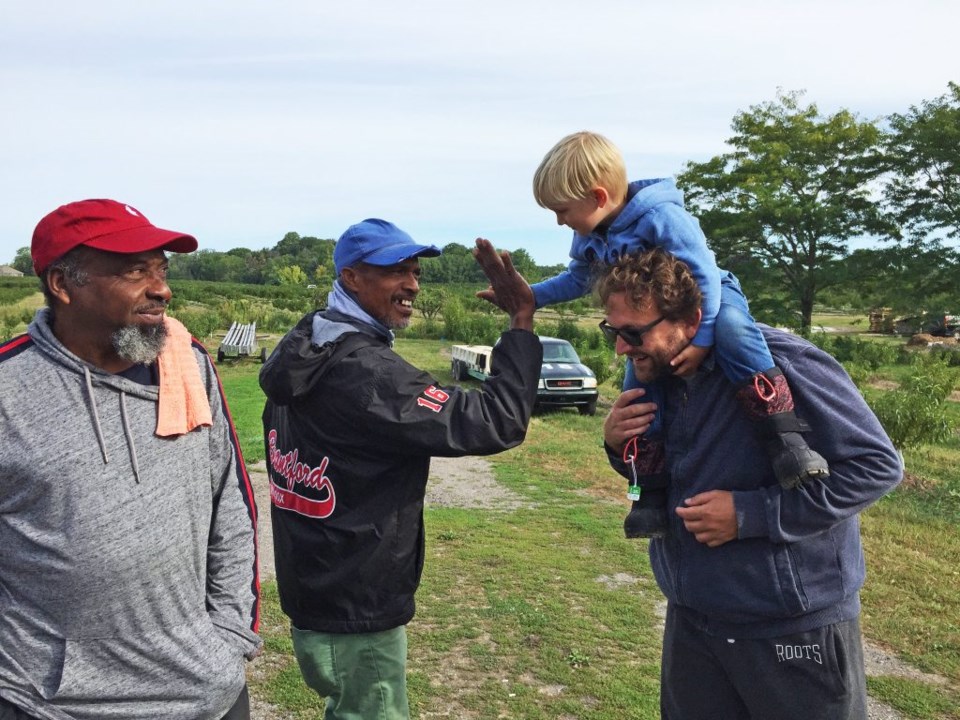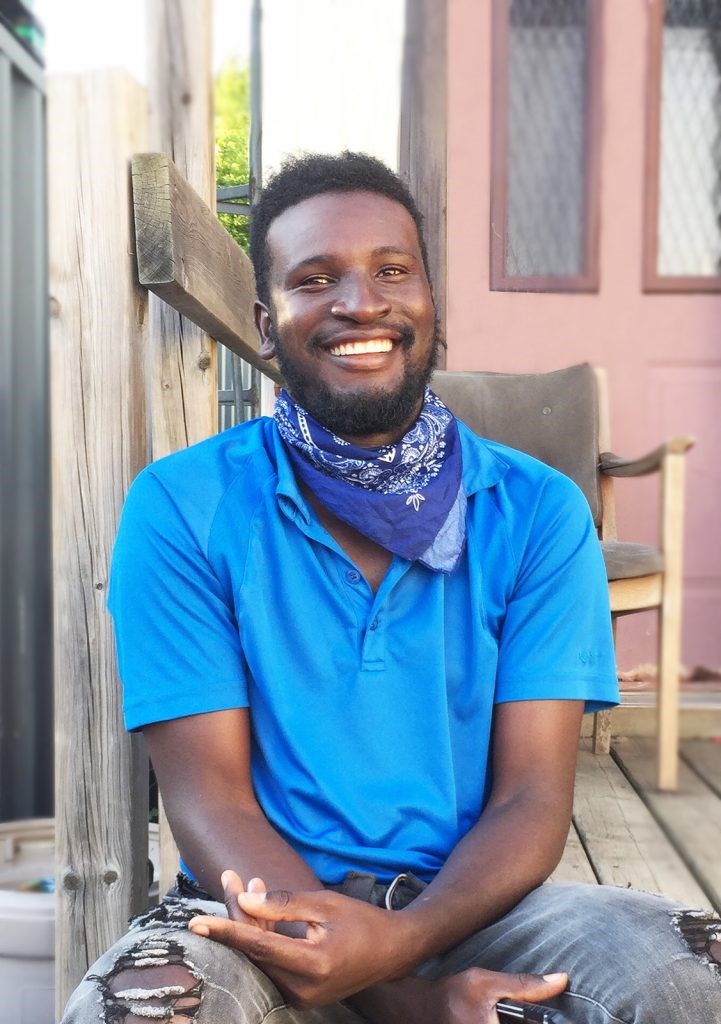
It’s a Tuesday night and I’m pulling up to the Serlucca farm on Concession 2, the car loaded with groceries. Dan, the farm owner, greets me with a big smile and waves me in towards the bunkhouse. A young man is sitting on the steps, engrossed in his phone messages.
I greet him in Jamaican patois from my car and he looks up, startled. I don’t recognize him and assume he’s new to the farm. Some of his coworkers amble out of the kitchen and onto the porch to check out the visitor, their faces lighting up in recognition. The tantalizing aroma of pimento, garlic, and jerk spices are wafting out of the open door. It’s been over a year since we’ve seen each other because of COVID restrictions, and the joy of this unexpected visit is mutual.
There have been no hugs or handshakes the past 16 months, but their smiles radiate warmth even at 20 feet away.
I ask the young man his name and where he’s from. The men laugh when Kemar says “Jamaica,” and look at each other knowingly. They understand where this conversation is going.
When I enquire about his hometown, the conversation goes back and forth, and he is emphatic I would have never heard of his small hometown.
“Maybe I’ve been there. Maybe I’ve even driven by your house.”
He laughs, rolling his eyes. “I don’t think so. Long Bough is just a likkle town, wet out inna bush.”
When I inform him that I had indeed stayed in the town of Long Bough, his eyebrows shoot up, the other men laughing at how I play the “connection” game.
I tell him I went to Long Bough in February, 2020, to stay at the home of Delroy and Joan Castella. Delroy had been coming to work in my neighbourhood for 35 years, and in 2019 suffered a stroke during harvest. I spoke of the many people who connected with Delroy over the months he stayed with us during his recovery, which resulted in him being the guest of honour at the Candlelight Stroll in December before he returned home. I describe how he lit the first candle that night, passing the flame to the lord mayor, who in turn passed it on to others, growing exponentially until the whole street was filled with the warm glow of thousands of flickering candles.
Kemar shakes his head incredulously. He explains that he lives just down the road from Delroy and Joan, and that his mom attends the same church.

Finding ways to connect in conversation whether at the grocery store, in the bank or on the roadside is an exercise in joy! It amazes me how quickly a relationship can progress from being a stranger to a neighbour who feels welcome and appreciated.
When I started volunteering 16 years ago, I observed that migrant workers employed on local farms were not welcome by many in our community, despite the fact that our agricultural industry is totally dependent on them to survive.
After our first trip to Jamaica in 2007, I returned home with a new appreciation of the sacrifices required by these men and women and their families. Providing a warm welcome to our neighbours on the farms creates an opportunity to connect, but also means a lot to their families, who are keenly aware of their loved ones’ experiences on the farms and in the community.
That year some friends and I began making soup and sandwiches to greet the workers arriving at farms in our neighbourhood, many who go almost 24 hours without a decent meal during their travels.
Soon after we put together welcome bags containing essentials to help them get through the first few days after arrival.
This idea has taken root and expanded in ways we could not have imagined, as more locals contribute to show support.
More than 575 Caribbean workers received welcome kits in 2021, and we’re not finished yet, with more emerging from mandatory quarantine in the next week. We have also delivered boxes of gloves, socks, neck buffs, toques, and essentials for some employers to distribute to their staff.
This year we created activity booklets for use during quarantine, which include two maps and practical information, such as biking distances from Virgil to Wal-Mart, etc.
Welcome kits are a simple, inexpensive idea for locals of all ages who want to connect and express appreciation. News seems to be spreading about the great community spirit in Niagara-on-the-Lake, and people elsewhere in Ontario are contacting us, wanting to know how to provide support to farm workers in their own rural areas.
We primarily reach out to the Caribbean men and women. Rev. Antonio Illas and his wife Cela are the energetic duo who head up the Migrant Farmworker Project run by the Anglican Diocese of Niagara to care for the Spanish speaking farm workers. We share resources and work together to see how we can best meet the practical needs of all farm workers.
Regardless of where we are from, there is one thing that we all agree on: there is no substitute for personal connection, that Zoom can in no way replace a hug or heartfelt conversation. This past year, many of us have gained a better understanding of the hardship of long-distance family relationships as experienced by farm workers, who for the duration of their eight-month to two-year contracts have only a tiny screen, and very limited data on their phone, to keep those threads of relationships intact.
Our fresh appreciation for human connection and face-to-face conversation has resulted in a growing number of cross-cultural friendships in our little corner of Niagara. Moving to Step 2 and 3, I hear the sounds of children playing and backyard conversations, a mix of Jamaican patois and laughter floating over the fence as families invite their Jamaican neighbours over for a Red Stripe and a time to relax, enjoying life together.
Recounting the story of Delroy to Kemar and his coworkers reminded me of how connecting with those who have traditionally been marginalized can transform a community, enriching all of us in the process.